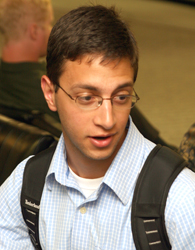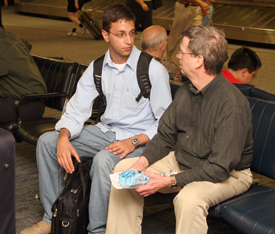After the end of the bloody Lebanese civil war (1974-1990) which I witnessed as a kid, the people of Lebanon have rebuilt their country, and the capital Beirut regained its status as a tourist and cultural centre of the region, as well as a centre for commerce, fashion and media. Every summer, hundreds of thousands of tourists visit Lebanon taking advantage of its beautiful beaches on the Mediterranean Sea, its green mountains, its many archeological sites and its modern resorts. This summer was no exception at all; Lebanon was filled with more than a million and a half tourists coming from the Arab Gulf, Europe and the Americas. This is a huge number for a country whose size is only 10 percent the size of Indiana.
 I too decided to visit my home country after a long spring semester and two months (May and June) doing science research. The atmosphere was incredible in Lebanon. There were so many things to do in one day. My friends and I would go to the beach in the morning, spend the afternoon in the mountains and go out to a café at night to follow the soccer World Cup games which are very popular there. Everybody was enjoying his time and everything seemed so peaceful. Beirut was like a shining star on the Mediterranean and nobody suspected that a terrible war was awaiting us.
I too decided to visit my home country after a long spring semester and two months (May and June) doing science research. The atmosphere was incredible in Lebanon. There were so many things to do in one day. My friends and I would go to the beach in the morning, spend the afternoon in the mountains and go out to a café at night to follow the soccer World Cup games which are very popular there. Everybody was enjoying his time and everything seemed so peaceful. Beirut was like a shining star on the Mediterranean and nobody suspected that a terrible war was awaiting us.
On July 12, Hezbollah, an Islamist militant organization financially and militarily supported by Iran, killed eight Israeli soldiers and captured two others in a cross-border raid without the approval of the Lebanese government. Support for Hezbollah is very mixed in Lebanon. In response Israel attacked the southern cities and villages of Lebanon, the southern suburbs of Beirut and the major infrastructure of the country: the airport, all sea ports and the important roads and bridges. In a few hours, Lebanon became the symbol of destruction and Beirut a ghost city. At first a lot of people thought that this conflict would be a matter of days, but it quickly became evident that the war would be a long one.
I live in the mountainous Christian region north of Beirut, a relatively safe area. However, we constantly feared a lack of food, drugs and medical supplies because the Israeli army had blocked all the ports of the country. People were buying food in huge quantities. I was helping the elderly who needed assistance in storing the right drugs depending on their medical conditions. It was chaos and no one wanted to believe that we might be enduring a humanitarian crisis in the near future.
Israel has the right to defend itself against Hezbollah but it is not acceptable at all that innocent civilians and pacifist sites be targeted. Those pacifist sites include a UN post in the south, an ambulance for the Red Cross and television antennas. I was particularly affected by the pictures of killed and mutilated children I have seen on television. The sight of those children made me wonder if we were really living in the 21st century. I am deeply sad for all the casualties among civilians on both sides of the conflict.
Taking into account the disastrous situation, I decided to leave the country earlier than planned. Since the airport had been attacked, the only way to escape was to fly from Damascus, the capital of neighboring Syria. The road from Beirut to Damascus was not safe; the Israeli warplanes had already hit big trucks circulating on this road from fear that they might be carrying arms coming from Iran through Syria to Hezbollah. Nevertheless, I have decided to take the risk because no one could guarantee that this road would remain in operation in the days to come. Indeed, I made the right decision at the right time: the road between Beirut and Damascus was destroyed this Saturday, just two days after I left…
 It was very difficult for me to say goodbye to my beloved ones. What would happen to them in my absence? Was it fair to leave them while they were facing such horrible conditions? I was a little bit nervous but I tried to stay strong and focused. My father insisted to accompany me to Damascus. He didn’t want me to make that trip alone. Our journey was marked by several scary moments such as the sight of already destroyed trucks on the road or when we had to overtake other running trucks. Luckily, we made it to Damascus. I was very tired both physically and psychologically. But my worries did not end here; my father had to go back to Beirut on the same road at night, when the Israeli air strikes are usually more violent and more frequent. He succeeded to reach Beirut safely, but I didn’t know that until I arrived to the States. Thank you Dad, I will never forget this.
It was very difficult for me to say goodbye to my beloved ones. What would happen to them in my absence? Was it fair to leave them while they were facing such horrible conditions? I was a little bit nervous but I tried to stay strong and focused. My father insisted to accompany me to Damascus. He didn’t want me to make that trip alone. Our journey was marked by several scary moments such as the sight of already destroyed trucks on the road or when we had to overtake other running trucks. Luckily, we made it to Damascus. I was very tired both physically and psychologically. But my worries did not end here; my father had to go back to Beirut on the same road at night, when the Israeli air strikes are usually more violent and more frequent. He succeeded to reach Beirut safely, but I didn’t know that until I arrived to the States. Thank you Dad, I will never forget this.
After a long and exhausting trip, I finally made it to Crawfordsville. I had left my family to join another one, the Wabash family, who stood beside me throughout those difficult moments. I am very touched by the support I have received from the Wabash community, and I am thankful to every person who asked about me in the last two weeks. I knew from the beginning that I wouldn’t face my hardships alone because I know very well how caring and engaged the Wabash community is.
I am very disappointed by the second half of my summer: I had planned to relax with family members and friends, and I was also supposed to have an internship in a leading hospital affiliated with Johns Hopkins International. It is definitely annoying to disrupt my summer in such a shocking way, but I still realize that the price I had to pay is absolutely nothing compared to others.
Not only did Lebanon lose the six billion dollars it was supposed to earn from tourism, but its infrastructure was severely damaged. Nothing but rubbles remains from the southern suburbs of Beirut, rubbles that return the echo of crying women and children and reflect the dark light of misery and pain in this hot month of July.
Beirut has been compared to the phoenix bird because it was burned down and rebuilt several times through its long history. It will resurrect once again; the people of Lebanon won’t let their capital down because they are hard-working people who have endured a lot through the years and centuries. It will be very painful to them to reconstruct their country when they had just finished rebuilding it after the recent civil war. But they will draw their will and strength from the heart of their extreme suffering.
Lebanon is one of the oldest countries in the world, the country where the first alphabet was invented and the first law school ever was built, and it is not today that Lebanon will collapse.
In photos: In both photos Wassim is chatting with Director of International Students, David Clapp. Wassim arrived at the Indianapolis airport July 27.